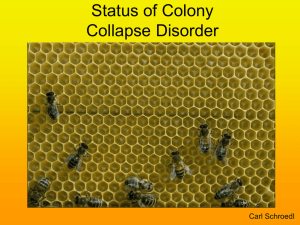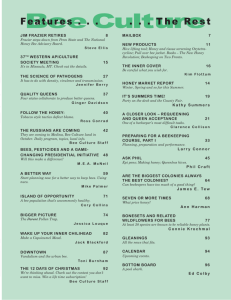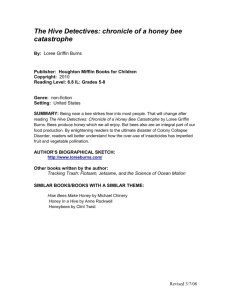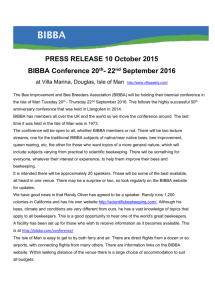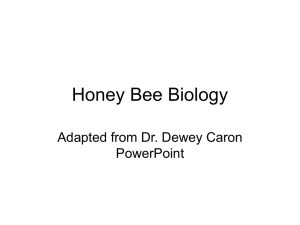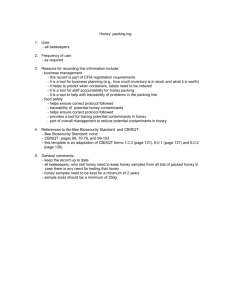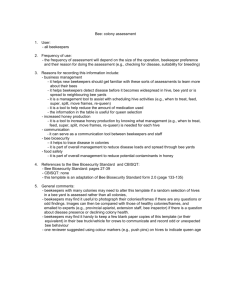Apiculture Specialist
advertisement
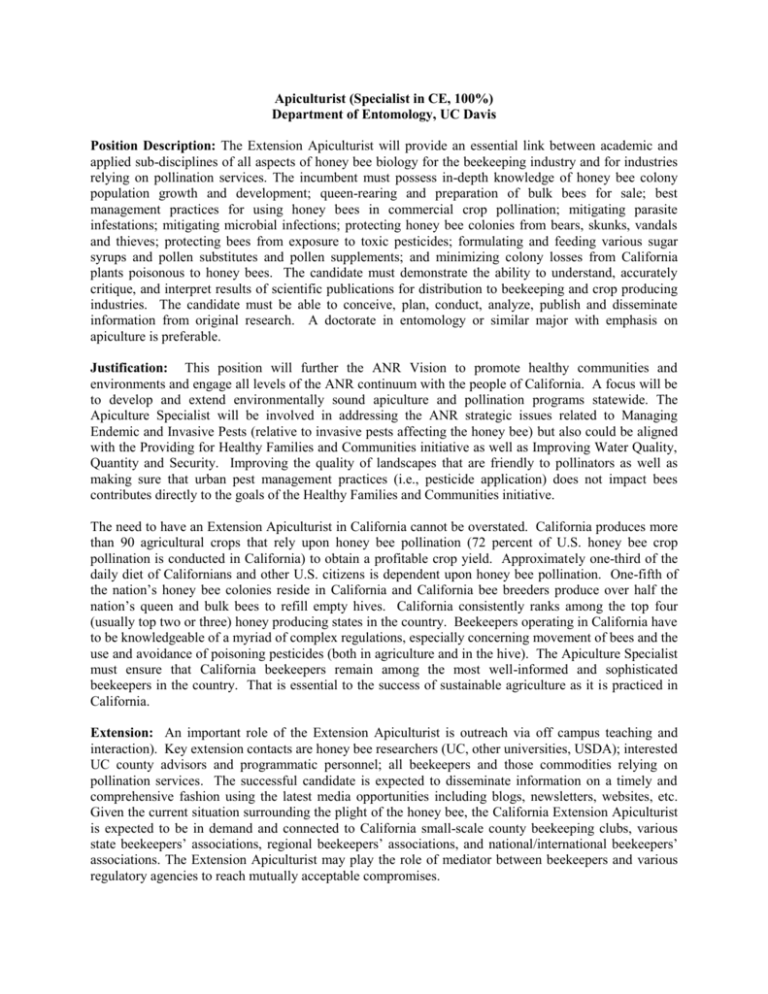
Apiculturist (Specialist in CE, 100%) Department of Entomology, UC Davis Position Description: The Extension Apiculturist will provide an essential link between academic and applied sub-disciplines of all aspects of honey bee biology for the beekeeping industry and for industries relying on pollination services. The incumbent must possess in-depth knowledge of honey bee colony population growth and development; queen-rearing and preparation of bulk bees for sale; best management practices for using honey bees in commercial crop pollination; mitigating parasite infestations; mitigating microbial infections; protecting honey bee colonies from bears, skunks, vandals and thieves; protecting bees from exposure to toxic pesticides; formulating and feeding various sugar syrups and pollen substitutes and pollen supplements; and minimizing colony losses from California plants poisonous to honey bees. The candidate must demonstrate the ability to understand, accurately critique, and interpret results of scientific publications for distribution to beekeeping and crop producing industries. The candidate must be able to conceive, plan, conduct, analyze, publish and disseminate information from original research. A doctorate in entomology or similar major with emphasis on apiculture is preferable. Justification: This position will further the ANR Vision to promote healthy communities and environments and engage all levels of the ANR continuum with the people of California. A focus will be to develop and extend environmentally sound apiculture and pollination programs statewide. The Apiculture Specialist will be involved in addressing the ANR strategic issues related to Managing Endemic and Invasive Pests (relative to invasive pests affecting the honey bee) but also could be aligned with the Providing for Healthy Families and Communities initiative as well as Improving Water Quality, Quantity and Security. Improving the quality of landscapes that are friendly to pollinators as well as making sure that urban pest management practices (i.e., pesticide application) does not impact bees contributes directly to the goals of the Healthy Families and Communities initiative. The need to have an Extension Apiculturist in California cannot be overstated. California produces more than 90 agricultural crops that rely upon honey bee pollination (72 percent of U.S. honey bee crop pollination is conducted in California) to obtain a profitable crop yield. Approximately one-third of the daily diet of Californians and other U.S. citizens is dependent upon honey bee pollination. One-fifth of the nation’s honey bee colonies reside in California and California bee breeders produce over half the nation’s queen and bulk bees to refill empty hives. California consistently ranks among the top four (usually top two or three) honey producing states in the country. Beekeepers operating in California have to be knowledgeable of a myriad of complex regulations, especially concerning movement of bees and the use and avoidance of poisoning pesticides (both in agriculture and in the hive). The Apiculture Specialist must ensure that California beekeepers remain among the most well-informed and sophisticated beekeepers in the country. That is essential to the success of sustainable agriculture as it is practiced in California. Extension: An important role of the Extension Apiculturist is outreach via off campus teaching and interaction). Key extension contacts are honey bee researchers (UC, other universities, USDA); interested UC county advisors and programmatic personnel; all beekeepers and those commodities relying on pollination services. The successful candidate is expected to disseminate information on a timely and comprehensive fashion using the latest media opportunities including blogs, newsletters, websites, etc. Given the current situation surrounding the plight of the honey bee, the California Extension Apiculturist is expected to be in demand and connected to California small-scale county beekeeping clubs, various state beekeepers’ associations, regional beekeepers’ associations, and national/international beekeepers’ associations. The Extension Apiculturist may play the role of mediator between beekeepers and various regulatory agencies to reach mutually acceptable compromises. Maintaining regular contact with the following is expected: California Department of Pesticide Regulation; California Department of Food and Agriculture; U.S. Environmental Protection Agency; National Honey Board; Project Apis m; California Farm Bureau Federation; California county beekeeping organizations; Western Apicultural Society, California Bee Breeders’ Association; American Beekeeping Federation; American Honey Producers’ Association; Entomological Society of America; Northern California Entomology Society; Apiary Inspectors of America; Bee Informed Partnership; and California County Agricultural Commissioners’ Association. Research: Independent and cooperative research provide opportunities to find solutions to problems of importance to colony health, productivity and to issues surrounding pollination. Successful grantsmanship from National and State agencies as well as from commodity groups is expected. Honey bee industry-related sources of funding include: National Honey Board, various state beekeepers’ associations, Project Apis m, and the Almond Board of California. Specific, individual donors will typically provide significant in-kind assistance by allowing their colonies to be used as experimental subjects. Research results must be published in refereed outlets with apicultural and entomological journals being the main release points: Journal of Apicultural Research, Environmental Entomology, Economic Entomology, America Bee Journal, and California Agriculture. The successful candidate is expected to deliver the research to stakeholder groups in a clear and comprehensive fashion via publications in outlets such as Bee Culture, the Speedy Bee and through newsletters, the web, etc. (discussed above). ANR Continuum: The Extension Apiculturist is expected to be in regular contact with faculty involved with bees and pollination at all UC campuses. In addition, the Extension Apiculturist will be in regular communication with CE County Advisors whose clientele include growers of crops that rely on bee pollination. Attendance at Advisor-sponsored meetings, workshops, and field days and preparation of written materials for distribution to clientele through these county based personnel is expected. Communication and interaction with other university researchers (both in and outside the state of California), and USDA researchers is expected. Departmental/Campus Continuum: The department has five areas of core competency and excellence, and the Extension Apiculturist (based on his/her interest) may contribute to several of these including Insect Behavioral Ecology (IBE), Insect Functional Biology (IBF) and Sustainable Insect Management (SIM). The IBE group focuses on the whole insect and its environment, with particular emphasis on behavioral and community ecology and demography. Most of the faculty members in this group are also members of one or more of UC Davis’ nationally-ranked graduate programs, including the Center for Population Biology and the Graduate Groups in Ecology and Animal Behavior. Faculty in the IBE include James Carey, Richard Karban, Sharon Lawler, Jay Rosenheim, Brian Johnson, Neal Williams and Louie Yang, Edwin Lewis, and Howard Ferris. The IBF research programs in the department integrate insect molecular ecology, physiology and chemical ecology using a strongly collaborative approach both within the department and among other departments and colleges. Faculty members in the group include Joanna Chiu, Bruce Hammock, Walter Leal, Ed Caswell-Chen and Fumio Matsumura. The SIM research group has been one of the department’s greatest strengths, with specialization in invasion biology, biological control, insect pathology, urban entomology and apiculture. Faculty members contributing to this area of emphasis include James Carey, Mary Louise Flint, Larry Godfrey, Edwin Lewis, Eric Mussen, Michael Parrella, Jay Rosenheim, Charlie Summers, Diane Ullman, Becky Westerdahl, and Frank Zalom. The Department of Entomology maintains the Harry H. Laidlaw Jr. Honey Bee Research Facility, a stand alone building on the west side of campus that is used by bee researchers from within California, across the country and around the world. We currently have Brian Johnson (apiculture), Neal Williams (native bees and pollination), and Robbin Thorp (emeritus), native bees and pollination who call this facility home for their research/outreach. There is also extensive collaboration with both Claire Kremen and Gordon Frankie (UC Berkeley). A honey bee researcher, Sue Cobey, teaches internationally recognized courses on bee breeding and artificial insemination at the Laidlaw facility, and we expect those to continue in the future. Adjacent to and west of the Laidlaw facility is the The Häagen-Dazs Honey Bee Haven. This half-acre bee friendly garden was designed to provide foraging opportunities for honey bee colonies at the facility in addition to providing the urban public with information on how they could develop their own bee friendly urban garden. The Honey Bee Haven is directly connected (via outreach) to the California Center for Urban Horticulture (CCUH) and their Your Sustainable Backyard series of educational events. In addition, the Department of Entomology has entered into a partnership with the Robert Mondavi Institute (RMI) to develop a Honey Center (modeled after the very successful Olive Center at the RMI.) Depending on the interest of the Extension Apiculturist, these ongoing programs represent opportunities for immediate involvement. Support: Clerical and other administrative support for day-to-day activities would be provided by staff in the Department of Entomology at UC Davis. The Extension Apiculturist’s office would be located in the Department of Entomology in Briggs Hall. Laboratory facilities would be located at Laidlaw Honey Bee Research Facility. An account manager in the Phoenix administrative cluster at UC Davis would handle grant administration and personnel matters. The candidate would receive departmental support for his/her program according to the same formula used for all other faculty members/Extension Specialists in the Department of Entomology. Other Support: The Apiculturist is expected to develop extramural funding opportunities to support a research and extension program. Successful grantsmanship from National and State agencies as well as from commodity groups is expected. Honey bee industry-related sources of funding include: National Honey Board, various state beekeepers’ associations, Project Apis m, and the Almond Board of California. In addition, direct participation in multi-state federally funded research projects related to managing honey bee health is strongly encouraged. Location: This position would be located on the UC Davis Campus where both the Entomology Department and the UC Statewide IPM Program are headquartered. A tight link to the core competency areas in Entomology with two I&R/OR bee related appointments, a strong emphasis in pollination in the Plant Sciences Department, the Laidlaw Facility, the Honey Bee Haven, the Honey Center, connections to the CCUH, already established linkages with collaborators in the state and at the national and international levels combine to make Davis an ideal location for this position.
